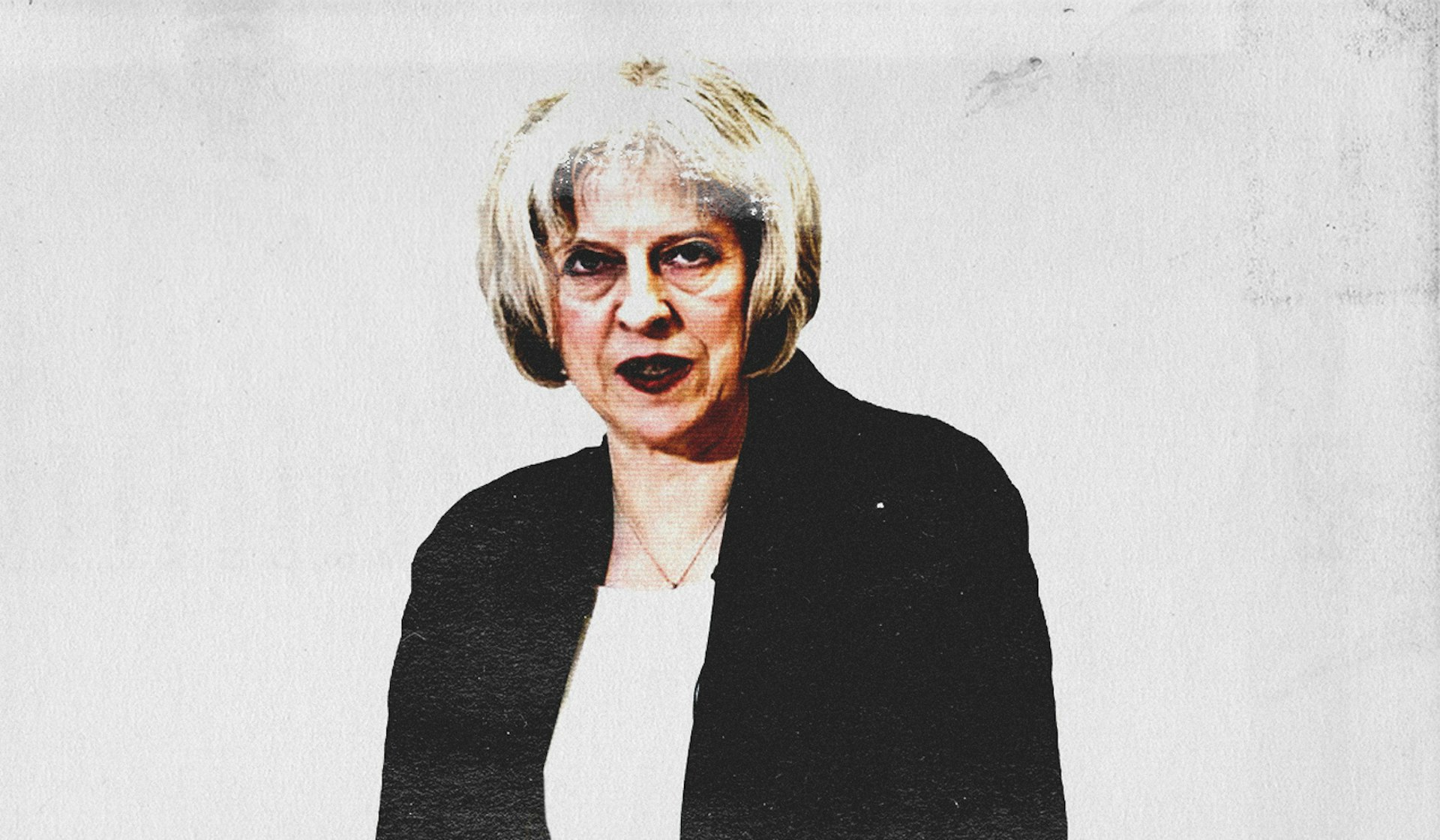
This general election marks the death of toxic Tory 'common sense'
- Text by Eleanor Penny
- Illustrations by Simon Hayes
With all the tedious familiarity of an injury twinging in cold weather, there was one refrain that was supposed to characterise this election: that Jeremy Corbyn was a dead man walking.
His policies ranged from the improbable to the downright deluded. A “common sense” ruled – the basic framework that guided the understanding of most public pundits – from liberals at the Guardian to yammering race-baiters in the Sun.
At best, he was a grandfatherly old coot, eyes fixed on some unfathomable utopia – at worst, he was a dangerous Trotskyite determined to haul our enlightened democracy back into soviet greyness. No sensible member of the British public would possibly vote for him. They just wouldn’t. But yesterday that assumption was blown clean out of the water, leaving columnists, talking heads, and some Labour grandees reeling in shock and confusion.
Even after the financial crash revealed as a sham the idea that capitalism is a route to prosperity, the myth that there is no alternative still reigns supreme in UK politics. This turns politics into a rather milquetoast, manegerial affair, a grubby tussle over a shrinking patch of political terrain which cannot, fundamentally, be changed.
Sure, it can be nudged or guided, merely to make life for the hardest-off a little better – or plunge them further into poverty. Lower corporation tax a little here, fiddle with interest rates there, dust around the soft furnishings. But ultimately, politics is the work of letting the market run its course.
This doctrine dismisses even the mildest form of Keynesianism – itself arguably an attempt to ‘save’ capitalism – it’s dismissed as a fairyland fantasy of a ‘magic money tree’. Any idea of the slightest ideological deviation is treated with contempt and suspicion.
Rampant cronyism that sees the Tories giving tax cuts to the business bigwigs who fund their bids for power – is simply the operation of normal politics, which should be allowed to progress untroubled by any opposing ideas. And the fourth estate has obligingly allowed such ideas to be painted as fringe lunacy.
It’s a magic trick – alternatives vanish from the scene, and the most callous, hard-nosed of ideologies are politely veiled with a patina of normalcy. It this that the Conservatives have routinely used to gloss over a cruel and economically disastrous policy agenda: when no alternatives are publicly acceptable, they can easily present themselves as the party of the everyday, of the common-sense, of stability. It mattered little that their slogans were hollow and their manifesto a shambles, they were backed by the overwhelming power of common sense.
So, what on earth happened to make the electorate kick back against this foregone conclusion? If you’re of a particularly patrician inclination, you can claim that the electorate has chosen idiocy over common sense. But that rather conveniently ignores how the media and political machinery that makes the neoliberal seem normal is slowly falling apart. Labour’s astonishing assault on the Tory majority has brought socialist policies firmly into the mainstream – into newsprint, TV, radio, and onto the doorsteps of millions of voters.
We shouldn’t underestimate the sheer scale of the weapons-grade cockup on the part of May – who through a mixture of arrogance and incompetence managed to forfeit what should have been a landslide victory. She and her team underestimated people’s capacity to see through its fear-mongering into the startling hollowness of the campaign. The manifesto was matched in dullness only by its vacuity, and May seemed physically repulsed by any member of the public to come within handshake-distance. This hollowness made space for the Labour Party to set the agenda when it came to the nitty-gritty of policy talk.
Where May talked ‘Brexit means Brexit’, Corbyn promised to pour cash into the NHS. May’s ‘better the devil you know’ line might have held water until you get to know the alternative devil and he’s offering you a £10 minimum wage and a student debt write-off.
Keen to avoid a total wipeout, even hardline anti-Corbynites fell instep with a genuinely radical manifesto. Thus television, radio, print media was suddenly filled with people saying the unsayable; that nationalisation is an economic boon, that people should be able to work less – that nuclear holocaust isn’t necessarily a desirable thing.
Doomladen predictions of a Labour wipeout were quietly shelved. More often than not, these interventions were drowned out by a cabal of frothing politicians and journalists quick to decry it as hopelessly utopian. But they were there. The power of ‘common sense’ lies in its ability to pass itself off as a seamless, uninterrupted whole, beyond whose bounds lie madness and fatal idealism. A perfect gleaming sphere. You only need to make the slightest crack to see beyond it another possible world.
Moreover, this machinery of the normal is rapidly rusting, as traditional media grows ever more distant from those it’s supposed to be talking to. The ability of the press to produce and maintain a sense of normality relies on its ability to give you a way of understanding your reality. So – if you’re unemployed, that’s because of immigrants. When you see a millionaire clocking off at three in the afternoon, that’s because his job is harder or more worthwhile than yours. That’s the concrete hook off of which a picture of normality hangs. But this only works if you’re talking about these concrete concerns in the first place.
And increasingly, this just isn’t the case. Often keen to roll out press releases sympathetic to Tory claims of economic recovery, the last two years have seen press jubilating about optimism in the economy and rising employment.
This doesn’t look much like the reality lived by millions of people. per-capita growth is flatlining and child poverty and homelessness are skyrocketing; the stories spun by the press of Tory success are for many folk, unrecognisable. They so rigorously fell instep with party, that they lost some of their the ability to persuade people along the way.
Combine this political inclination with falling audiences for much of the mainstream media, the rise of independent media and social media as people’s main streams of information, and the mainstream press has less and less power to guarantee that neoliberalism remains the assumed norm. Against this backdrop, leftwing media and Momentum activists pounding the doorstep – although far into ‘crackpot territory’ – can clean up by talking about people’s actual lived experiences of a growing economic, cultural and political malaise.
Talk directly to these concerns, and you can lift far more than your weight when it comes to shifting the ‘common sense’ of the contemporary political imaginary. UKIP normalised their immigrant-bashing agenda by talking frankly about the indignities visited on (white) working people. It worked. And that’s exactly what the Labour campaign set out to do; capitalising on concrete economic populism that made much meat of falling wages and widespread food banks, set against a backdrop of still-rising national debt.
When these everyday disasters are brought into the light of public scrutiny, the old common-sense explanations prove woefully feeble and inadequate. This manoeuvre paves the way for a shift in what looks like common sense – in the wonk-talk of Blairites, “what the public will accept”.
They set out for a sweeping majority, but after blundering from one flamboyant electoral fuck-up to the next, Tories are clinging to power by their fingertips in a DUP-backed coalition with a majority of one. If someone sleeps through their alarm then no majority for May. In many ways, they’ve already lost.
And now they can’t simply paint their opponents as lunatics, Blairites can’t rely on crass anti-immigrant appeals to a public it sees as entirely gulled by Ukippery. The narrow bounds of mainstream political logic have been ruptured. In our millions, we’ve rejected a craven ‘common sense’ of more cuts and more privatisation. We know now that there is an alternative future – and that future is ours for the taking.
Enjoyed this article? Like Huck on Facebook or follow us on Twitter.
